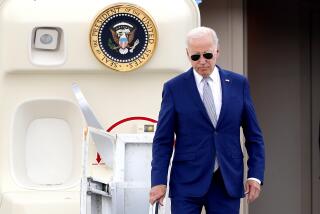Rice Straddles South Asian Divide
- Share via
NEW DELHI — Secretary of State Condoleezza Rice met Wednesday with top officials in India and Pakistan, discussing a range of contentious issues that included the desire of the rival South Asian neighbors to buy advanced F-16 fighter jets from the United States.
India, which has been moving closer to the U.S. after relying on Russian military supplies for decades, wants to buy the warplanes but opposes Pakistan’s long-standing request to replenish its own fleet of F-16s.
Beginning the day in New Delhi, Rice said she discussed the issue with Indian officials as part of broader talks on security cooperation but indicated that no deal on the warplanes had been reached. Neither Rice nor Foreign Minister Natwar Singh provided details in a news conference following their meeting.
“We are going to continue to have broad discussions about the security need, about the defense needs of India,” Rice said. “I am quite certain when I go to Pakistan that I will have discussions about the defense concerns, the defense needs of Pakistan. But there has been no such agreement” to sell F-16s.
Singh told reporters: “We did express certain concerns about certain matters on the defense issue as to how it might create some complications. But I think there are no serious differences of opinion.”
Rice later traveled to Islamabad and met with Pakistani President Pervez Musharraf and Prime Minister Shaukat Aziz. Officials said their discussions included the Pakistani fight against Al Qaeda and its supporters along the Afghan border, the negotiations between India and Pakistan and Pakistan’s desire to acquire more advanced weapons from the U.S.
A news release issued by the Pakistani government said Musharraf urged the U.S. to help reach a resolution to the Kashmir dispute that would address the aspirations of the territory’s people. Kashmir has been divided between India and Pakistan for nearly six decades, and the Indian portion has been the site of an uprising that Indian officials say is backed by Pakistan.
Musharraf told Rice “that normalization in the region would not be possible without a settlement of the core dispute between Pakistan and India,” the statement said.
Aziz reportedly told the secretary of State that Pakistan’s ability to credibly defend itself would be a guarantor of stability in the region.
However, many Indians fear that U.S. sales of advanced weapons to Pakistan could prove dangerous to India.
Ajai Sahni, an Indian strategic affairs analyst, said Washington must be aware that, as it helps arm Pakistan to fight the war against terrorism, most of the weapons the Musharraf regime wants to buy “have an application against India.”
“The F-16s fall into this category,” he added. “There are obvious Indian concerns here and certainly some ethical issues as the U.S. arms two traditional adversaries. This certainly gives meat to the stereotypes that U.S. defense industries have fueled rivalry and war across the world.”
Earlier in the day, Singh sought to smooth over disagreements with Washington, suggesting that improvements in ties between the two nations that began under President Clinton are continuing under the Bush administration.
“There are one or two items on which we don’t agree,” the Indian foreign minister said. “Our relations have now reached a maturity that we can discuss these things freely and frankly.”
Rice confirmed that she had expressed U.S. concern over India’s decision to buy natural gas from Iran, which Washington has sought to isolate with economic sanctions while it seeks guarantees that the Iranian government will not develop nuclear weapons. A 1,724-mile natural gas pipeline that would pass through Pakistan is expected to be completed by 2009.
The $4.5-billion project is seen by some in New Delhi as a step in overcoming decades of enmity between India and Pakistan as well as a supply route for energy-starved India.
Rice said she supported a “large-scale energy dialogue” with India to find ways to meet its growing demands.
Singh hinted that the country would go ahead with the pipeline project. He said Mani Shankar Aiyar, India’s petroleum and natural gas minister, is finalizing details with Iran and Pakistan on the project.
It was Rice’s first visit to the subcontinent since becoming secretary of State in January. Her weeklong trip also will take her to Afghanistan, Japan, South Korea and China.
She praised the peace process between India and Pakistan, which have fought three wars since independence from Britain in 1947, two of them over Kashmir. Relations between the neighbors have been improving since last year’s cease-fire at the Line of Control that divides the Himalayan territory.
Singh said peace efforts with Pakistan were “progressing satisfactorily” but repeated his government’s insistence that Pakistan completely halt any support for militants in Kashmir.
Special correspondent Mubashir Zaidi in Islamabad contributed to this report.
More to Read
Sign up for Essential California
The most important California stories and recommendations in your inbox every morning.
You may occasionally receive promotional content from the Los Angeles Times.













